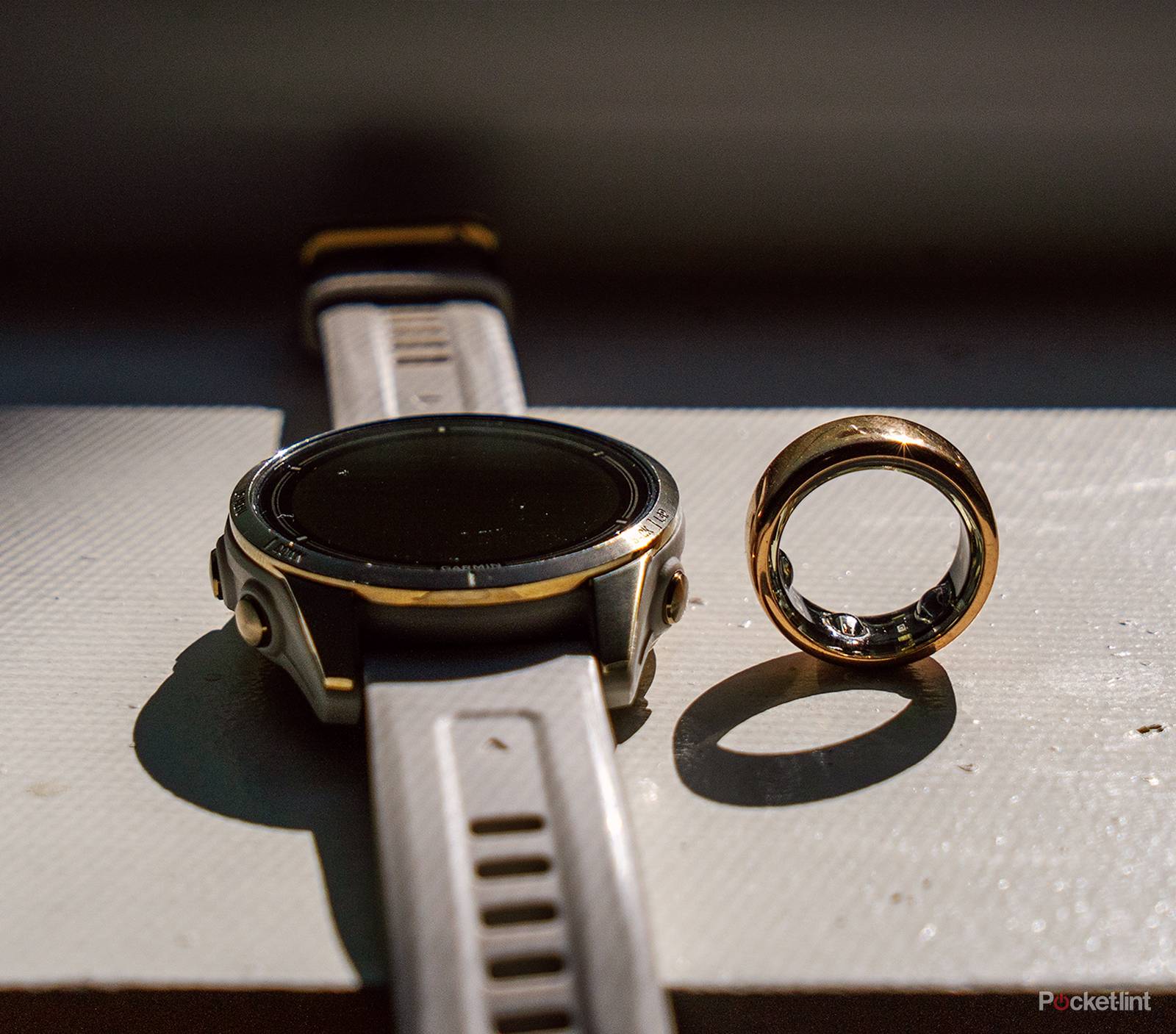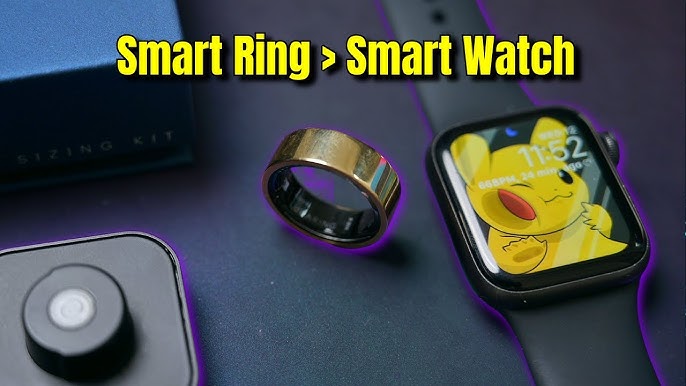Are you torn between choosing a smartwatch or a smart ring? Both gadgets promise to make your life easier, but which one truly fits your needs?
Imagine having the right device that keeps you connected, tracks your health, and matches your style—all without hassle. You’ll discover the key differences, benefits, and downsides of each option. By the end, you’ll know exactly which smart accessory suits your lifestyle best.
Ready to find out what works for you? Let’s dive in.
Smartwatch Features
Smartwatchesusually have a large color displaythat shows time and apps clearly. The screen is often touch-sensitive, making it easy to use. Designs vary from sporty to classic styles, fitting many tastes.
Health and fitness trackingis a key feature. Smartwatches can count steps, measure heart rate, and track sleep. Some models also monitor blood oxygen and stress levels. These tools help users stay healthy.
Smartwatches offer strong connectivity. They show notifications for calls, texts, and apps right on the wrist. Bluetooth links the watch to a smartphone. Some even support Wi-Fi and GPS for more freedom.
Battery lifevaries by model and use. Most smartwatches last one to two days on a single charge. Some can go longer in power-saving modes, but daily charging is common.
Smart Ring Features
The compact designof a smart ring makes it easy to wear all day. It fits snugly on your finger and is lightweight. This means it does not bother you during any activity.
Smart rings have activity and health monitoringfeatures. They track steps, heart rate, sleep, and more. This helps you keep an eye on your health without extra devices.
Notification alertson smart rings are subtle but clear. You can feel vibrations or see small lights. This lets you know about calls, messages, or reminders quickly.
Smart rings have good battery and chargingtimes. They usually last several days on one charge. Charging is simple, often with a small dock or cable.
Performance Comparison
Smartwatchesusually have more sensors and track data more accurately. They measure heart rate, steps, and sleep well. Smart ringshave fewer sensors but still track important data like heart rate and sleep. Their accuracy can be slightly lower due to size limits.
The user interfaceof smartwatches is bigger and easier to use. You can tap, swipe, and see lots of info at once. Smart rings use small screens or lights, making interaction simpler but limited.
| Feature | Smartwatch | Smart Ring |
|---|---|---|
| Sensor Accuracy | High accuracy with multiple sensors | Good but fewer sensors |
| User Interface | Large touch screen, easy to use | Small display, limited interaction |
| Device Compatibility | Works with many phones and apps | Compatible but fewer supported apps |

Credit: www.boat-lifestyle.com
Usability And Comfort
Smartwatchesare often larger and may feel heavier on the wrist. Smart ringsare small, light, and less noticeable. This makes rings more comfortable for all-day wear. Some people may find watches easier to see and use due to their bigger screens.
Smartwatches have touchscreen controlsthat allow quick access to apps. Smart rings usually use simple gesturesor taps. This can be easier for some users but limits the number of features.
| Feature | Smartwatch | Smart Ring |
|---|---|---|
| Daily Wearability | Bulkier, may feel heavy | Lightweight, barely felt |
| Ease of Use | Touchscreen, many apps | Simple taps, fewer functions |
| Customization | Many watch faces, bands | Limited styles, fewer options |
Price And Value
The cost rangefor smartwatches varies widely. Basic models start around $50, while advanced ones can cost over $400. Smart rings usually cost between $100 and $300. This makes smart rings a bit cheaper on average.
Considering features for the price, smartwatches offer more options like GPS, calls, and apps. Smart rings focus on simple tasks like notifications and health tracking. For those who want many features, smartwatches give better value.
Thinking about long-term investment, smartwatches may need battery replacement or updates more often. Smart rings have longer battery life but fewer upgrades. Choose based on what fits your daily needs and budget.
Ideal Users For Each
Fitness enthusiastsoften choose smartwatches for detailed tracking. They get heart rate, steps, and workout data easily. Smart rings track some fitness data but less detail. Smartwatches show stats clearly during exercise.
Tech savvy usersenjoy smartwatches for apps and customization. They like changing watch faces and using many features. Smart rings offer fewer apps but are easier to wear all day. Each device suits different tech needs.
Minimalist lifestylefits smart rings well. They are small, light, and simple. Rings do basic tracking without bulk. Smartwatches can feel big and heavy on the wrist. Rings suit those who want less to carry.
Professional useoften favors smartwatches. They provide notifications, calls, and quick replies. Smart rings give alerts but less control. Smartwatches help stay connected without phone use. Rings are good for subtle alerts in meetings.
Future Trends
Smart rings and smartwatches will soon have better health trackingfeatures. Sensors will be smaller but more accurate. Expect new ways to check your heart rate, sleep, and activity.
Both devices will connect more with other gadgets like phones, cars, and home devices. This integrationmakes life easier. Imagine controlling lights or music with a ring or watch.
| Market Growth | Details |
|---|---|
| Smartwatches | Steady rise in sales, popular for fitness and notifications |
| Smart Rings | Fast growth, especially for health and discreet use |
| Future Trend | More users choosing wearable tech for daily life |

Credit: www.youtube.com

Credit: www.pocket-lint.com
Frequently Asked Questions
Which Is More Accurate: Smartwatch Or Smart Ring?
Smartwatches generally offer more accurate health tracking due to advanced sensors. However, smart rings provide reliable data for heart rate and sleep monitoring. Accuracy depends on brand quality and sensor technology used in each device.
Are Smart Rings More Comfortable Than Smartwatches?
Smart rings are smaller and lighter, making them more comfortable for continuous wear. Smartwatches can feel bulky during physical activities. Comfort preference varies, but many find smart rings less intrusive.
Can Smartwatches Do More Than Smart Rings?
Yes, smartwatches offer more features like notifications, GPS, and apps. Smart rings focus mainly on health tracking and subtle notifications. Choose based on whether you want multifunctionality or simplicity.
Which Device Has Better Battery Life?
Smart rings typically have longer battery life, lasting several days to weeks. Smartwatches usually need daily or every few days charging. Battery life depends on usage and model specifications.
Conclusion
Choosing between a smartwatch and a smart ring depends on your needs. Smartwatches offer a big screen and many features. Smart rings are small, light, and easy to wear. Both track health and notifications well. Think about comfort, style, and how you will use it.
Your daily habits can guide your choice. Either device can help you stay connected and healthy. The best choice fits your lifestyle and preferences. Simple and useful—that’s what matters most.

Marry Christin, a passionate fashion designer and style enthusiast. Fashion isn’t just my profession—it’s my addiction! Along with my expert team, I bring you honest reviews of the latest fashion trends, including shoes, boots, sandals, dresses, and more.

